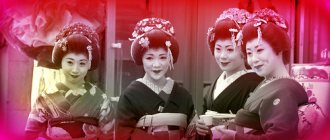Japanese mentality and society
Mentality is a national character that has been formed over many centuries - the first mention of this state is found in Chinese historical chronicles in 250.
AD The mentality of the Japanese was greatly influenced by the religions they professed - Buddhism, Zen, Shinto, Confucianism and, of course, natural isolation from the rest of the world, which resulted in hypertrophied loyalty to traditions. And today this amazing nation, being a full member of the community of the most developed world powers, manages to maintain its identity even in such “unified” areas as business and public relations. The Japanese are characterized by hard work and diligence, which have always been revered in this country as the main virtues. What remains from the code of honor of the Japanese samurai of the entire nation is a sense of duty, responsibility, the desire to sacrifice one’s interests for the sake of common high goals, as well as the ability to behave with dignity and not lose “one’s face.” This nation is distinguished by discipline and punctuality; the Japanese themselves do not allow them to be neglected and do not really forgive others for them.
Living in a country where there are not enough useful or just land resources also left its mark on the mentality of the Japanese. They are thrifty and prudent, not prone to excessive luxury and extravagance. Natural observation and attention to the smallest details allow them not only to appreciate and enjoy the beauty of the world around them, but also to find any opportunities for economical use of resources and search for progressive technological solutions for their maximum conservation. No wonder Japan is considered the most technologically advanced country in the world.
Japanese mentality in everyday life
All Japanese are distinguished by innate politeness and deep respect for other people. They will never allow themselves to violate the boundaries of decency or personal ones. You will never hear questions from a Japanese about your private life; they are not inclined to discuss their own or other people’s fate with anyone, or give unsolicited advice.
Residents of the Land of the Rising Sun have retained some naivety and sentimentality, they are distinguished by a special sense of beauty, they are aesthetes in everything and are able to create beautiful interiors in their homes, using a minimum of very laconic design details.
When it comes to expressing personal feelings, even with close people, the Japanese are very restrained. It is still not customary for the older generation to express their feelings in public - to kiss or hug someone. Young people, especially in cities, are already behaving more freely in this regard.
Features of the formation of the Japanese mentality
A debt of gratitude.
The cornerstone of Japanese morality is loyalty, understood as a debt of gratitude to elders. Honoring parents, and in a broader sense, submission to the will of elders, is, in the Japanese view, the first of the virtues, the most important moral duty of a person. It is devotion, based on the duty of gratitude, that makes the axis “oya-ko” (“father-son”) so strong, on which the vertical structure of the Japanese family and other social groups created in its image is based - the relationship between father and son, teacher and student, patron and ward.
Submission to parental will remains the embodiment of the debt of gratitude to this day. Of course, these days there have been more and more examples where a son refuses to marry the betrothed bride or inherit the family profession. Seeing how young couples walk through the streets hugging, one might think that life has not left any stone unturned from traditional house-building. Yet this is not entirely true. Let independent acquaintances and meetings between boys and girls become more common. The main thing has not changed - a wedding in Japan is still not so much a personal matter as a family affair. Although there is a lot of talk about love marriages, they still remain the exception rather than the rule. And although the number of matchmaking marriages has decreased, they still make up the majority.
For the Japanese there is almost no concept of any personal affairs. The habit of always being literally elbow to elbow with other people; traditional life, which essentially excludes the very concept of private life - all this helps the Japanese adapt to conditions that in the West sometimes lead people to the brink of mental breakdown.
Although traditional morality does not allow keeping one's soul wide open, the Japanese do not like to be left alone behind a closed door. Until recently, most Japanese homes were not locked. In a Japanese hotel there is no such thing as a room key, because sliding partitions, like windows, in principle should not have locks. Even in a Western hotel, a Japanese often keeps his room door open...
If you think about what features, what human qualities the Japanese had to sacrifice for the sake of their way of life, first of all, perhaps, one should name ease and spontaneity. The Japanese really lack ease, because traditional morality constantly forces them to do something. Strict subordination, which always reminds a person of his proper place, requires constantly maintaining distance in the order of life; awareness of one’s belonging to a group, readiness to put loyalty to it above personal beliefs; prescribed courtesy, which fetters live communication, sincere exchange of thoughts and feelings - all this dooms the Japanese to a certain isolation (if not personal, then group) and at the same time gives them a fear of being alone with themselves, a desire to avoid what they called “sabishi”. The foundations of the patriarchal family are the foundations of the Japanese way of life. Vertical connections “oya - ko”, that is, “father - son”, and in a broader sense “teacher - student”, “patron - ward”, can be traced and make themselves felt everywhere. The life path of a Japanese, even in times of cruel class divisions, was less determined by his origin than in other Asian countries. It is generally accepted that a person’s future depends not so much on kinship, but on whoever fate encounters between the ages of 15 and 25, at the time of embarking on an independent path, in the most important period according to Japanese ideas, when every person acquires an “oya” - a teacher. , a patron, a kind of adoptive father - no longer in the family, but in his chosen field of activity.
If a rural teenager goes to apprentice to a blacksmith, it is this person who becomes his patron for life: it is he, and not his father, who matches his bride and sits in the place of honor at his wedding. If a young man is taken to a factory on the recommendation of a fellow countryman, this guarantor can henceforth always count on the unconditional loyalty of his “co”, as required by the duty of gratitude.
Although the Japanese avoid loneliness and love to be in public, they do not know how, or rather, cannot easily and freely get along with people. Friendly connections between persons of different ages, positions, and social affiliations are extremely rare. The circle of those with whom a Japanese maintains contact throughout his life is very limited. With the exception of relatives and former classmates, these are, as a rule, colleagues of the same rank. If the friendship of peers at school can be called horizontal relationships, then in the future a person only has much stricter vertical relationships between seniors and juniors, superiors and inferiors.
The bonds of mutual dependence discussed above are like a double-edged leash. On the one hand, they pull the followers behind the leader. But, on the other hand, they force the leader to look back at the group, to impose his will on it so that at least the appearance of general agreement is preserved. Japanese morality prescribes avoiding direct confrontation and not allowing situations where one side would completely prevail over the other. The situation cannot be brought to the point where the defeated “loses face” and appears humiliated and insulted before others. This would mean touching such a painful chord as “weights”, or a debt of honor, that is, making oneself a mortal enemy.
If such a primary virtue for the Japanese as the duty of gratitude is rooted in ancient Chinese morality, then the duty of honor is a purely Japanese concept that has nothing in common with either the teachings of Confucius or the teachings of the Buddha. It is difficult to reveal the meaning of “giri”, because even the Japanese themselves cannot give it a very clear interpretation. “Weights” are a kind of moral necessity that sometimes forces a person to do something against his own desire or against his own benefit. The old French expression “the situation obliges” is quite close to this term. “Giri” is a duty of honor, based not on abstract concepts of good and evil, but on strictly prescribed regulations of human relations, requiring appropriate actions in appropriate circumstances.
In contrast to the unpaid debt of gratitude, the Japanese view the debt of honor as a kind of additional burden, the imprudent increase of which should be guarded against. Since any service requires reciprocity and must be rewarded somehow, the Japanese try to avoid favors from strangers. This is even reflected in the fact that speech patterns intended to express gratitude carry, oddly enough, a tinge of some kind of regret. For example, the word “arigato,” which is usually translated as “thank you,” literally means “you are putting me in a difficult position.” Another similar phrase “sumimasen” means: “ah, this will never end,” or: “ah, now I will never repay you.” Thus, already expressing gratitude, the Japanese, as it were, regretfully admits that he remains in debt to someone.
The desire to avoid or provide random services sometimes gives the impression that the Japanese are unresponsive people. But this is not a matter of callousness. To do something for a stranger without his request means to put him in the position of a moral debtor, to take advantage of his difficulty - this is the absurd paradox that the Japanese concept of the duty of honor leads to.
“Shame is the soil on which all virtues grow” - this common phrase shows that the behavior of the Japanese is regulated by the people who surround him. Act as is customary, otherwise people will turn away from you - this is what the duty of honor requires of a Japanese. The meaning of “weights,” therefore, is better expressed not by the French expression “situation obliges,” but by the words “tradition obliges.”
“Giri”, or the duty of honor, manifests itself, firstly, in relation to others (as a type of our concept of “conscience”), and secondly, in relation to oneself, to one’s own reputation (which largely corresponds to the fact that we call self-love). It encourages a person to prevent situations in which both himself and someone else may find himself humiliated or insulted.
The duty of honor does not allow the Japanese to show his inability to do what he is required by position to be capable of. The reluctance to “lose face” sometimes prevents a Japanese doctor from refusing an erroneous diagnosis. For the same reason, teachers do not like it when students turn to them with questions.[15 p. 48].
To say that the Japanese are very proud, that they value their honor highly, means showing only one side of their character. Intransigence to insults, painful sensitivity to any humiliation of their personal dignity did not lead to the fact that revenge became the dominant feature of human relationships. The concept of “weights” has acquired a kind of return meaning. The debt of honor towards oneself from an early age teaches the Japanese to spare the pride of others.
Hence the desire to avoid direct competition, where choosing in favor of one of the parties would mean “losing face” for the other. It is the mutual fear of “losing face” that gives rise to the need for a third person, that is, a mediator. The Japanese resort to his services in a variety of cases, from commercial transactions to matchmaking.
The desire to avoid an open clash of opposing views is also evident among the Japanese in decision-making practice. These decisions are usually not the result of someone’s personal initiative, but the result of coordinating the opinions of all interested parties - as if a common denominator was found on the basis of mutual concessions. Moreover, according to the norms of Japanese business ethics, the main virtue is not the one who firmly stands on his own (even if he is right), but the one who shows a willingness to compromise for the sake of general agreement.
First of all, the Japanese try not to notice for as long as possible what disrupts the established order of things. They consider it natural to delay making certain decisions until they are no longer necessary. But this is also the root of another important national trait: Japan is sometimes a country of sudden changes, sharp turns made after a long delay.
So the Japanese are looking for solutions that bring together the views of all interested parties, each of which has something of a veto power. If, despite lengthy discussions, someone still opposes this initiative, the issue is not resolved at all, but is postponed. When a problem becomes urgent, the lower levels of the apparatus first of all look at how they acted in similar cases before, and, taking into account the changed situation, prepare possible solutions.
The process of coordinating opinions begins in the most interested group, and then moves up step by step. Only after painstaking preparation is the issue brought up for discussion by management.
The Japanese, regardless of the position he holds, is careful not to oppose himself to others, to find himself in isolation, or to bring matters to an open clash of opposing views. Therefore, the discussion usually drags on for a long time until each participant, step by step, states his position, modifying it along the way taking into account the statements of others. The purpose of debate is to identify differences of opinion and gradually bring them to general agreement.
Bound by strict rules of behavior and norms of “proper place,” the Japanese generally prefer to overcome the most acute disagreements not at meetings, but over drinks, when alcohol helps to temporarily throw off the shackles of etiquette. The huge expenses of Japanese companies for “representational purposes”, or simply put, for drinking in bars and cabarets, are motivated by the fact that such establishments serve as a convenient place for reconciling conflicting opinions.
It is typical for business relations in Japan that the party forced to make the greatest concessions traditionally receives an advantage in resolving some other issue, sometimes completely unrelated to the first, or receives assurances that if a similar dispute arises in the future, the decision will be made in her favor. Willingness to compromise is considered a virtue that should be rewarded.
It is important to keep in mind, however, that compromise as perceived by the Japanese is a mirror of the moment. Just as their morality divides actions not into good and bad, but into proper and improper, the Japanese take it for granted that an agreement is valid only so long as the conditions under which it was reached remain. Where the Englishman says: “Since a dispute has arisen, let’s turn to the text of the agreement and see what is written there,” the Japanese will argue that if the situation has changed, the previous agreement should also be revised.
Buddhism. Coexistence of religions. Confucianism.
For a long time, the Land of the Rising Sun managed to stay away from the campaigns of conquerors thanks to the Korea Strait, which separates the country from the Asian continent. However, an invasion from across the seas did occur - 14 centuries before the American occupation. True, this was an invasion of ideas, not troops; Moreover, the bridge over which the civilization of India and China rushed to the Japanese islands was Buddhism.
Buddhism took root on Japanese soil as the religion of the nobility, while Shinto remained the religion of the common people. The average Japanese has accepted only the surface layer of Buddhist philosophy, primarily the idea of impermanence and the fragility of all things (the natural disasters to which the island country is prone contributed to such a worldview).
Shinto and Buddhism - it is difficult to imagine a more striking contrast. On the one hand, the primitive pagan cult of deification of nature and veneration of ancestors; on the other, a fully established creed with a complex philosophy. It would seem that an irreconcilable struggle between them is inevitable, in which the alien force must either completely suppress the local one, or, conversely, be rejected due to its complexity.
However, neither one nor the other happened. Two such dissimilar religions have peacefully coexisted and continue to coexist. Instead of religious wars, something similar to a union of two religions developed. It became a tradition among rural communities to build Shinto and Buddhist temples in the same place - it was believed that the Shinto gods would most reliably protect the Buddha from local evil spirits.
Such proximity bewilders, if not completely confuses foreign tourists: what religion, in the end, do the Japanese prefer? In fact, every Japanese considers himself both a Shintoist and a Buddhist. How can we explain this coexistence of gods? A kind of division of labor. Shinto reserved for itself all the joyful events in human life, giving way to Buddhism for the sad events. If the birth of a child or a wedding is celebrated with Shinto ceremonies, then funerals and commemorations of ancestors are carried out according to Buddhist rites. Shinto also reserved for itself all local community celebrations associated with natural phenomena, as well as ceremonies that are supposed to begin any important work, for example: plowing or harvesting, and in our time - the laying of a skyscraper or the launching of a giant tanker. The only national holiday associated with Buddhism is “Bon” - the day of remembrance of the dead. It is celebrated in the middle of summer, and celebrated cheerfully to please the ancestors. There is a custom to remember each deceased with a candle, which is floated in a floating paper lantern down the river.
The coexistence of gods on Japanese soil was by no means always peaceful. As in other countries, there are known attempts by those in power to use religious feelings for their own purposes. From the beginning of the 17th century, the military rulers of the country - the shoguns of the Tokugawa dynasty - began to intensively propagate Confucianism with its idea of submission to superiors.
So, Shinto endowed the Japanese with sensitivity to natural beauty, cleanliness and echoes of legends about their divine origin. Buddhism colored Japanese art with its philosophy and strengthened the people's innate resistance to the vicissitudes of fate. Finally, Confucianism brought with it the idea that the basis of morality is loyalty, understood as a duty of gratitude to elders and superiors.
For the Japanese, a priest is not a mentor of life, as, say, for Catholics, but simply a person who performs the prescribed rituals as ordered.[16, p. 38].
In general, the Japanese are not a religious people. It would not be a great exaggeration to say that the role of religion among them is largely replaced by the cult of beauty generated by the deification of nature. The combination of monsoon winds, warm sea currents and subtropical latitudes has made Japan a country with a unique climate, where spring, summer, autumn and winter are extremely clearly defined and replace each other with unusual punctuality. Even the first thunderstorm, even the most powerful typhoon, usually falls on a certain day of the year. The Japanese find joy in not only following this change, but subordinating the rhythm of life to it. The Japanese, even in the city, remain not only sensitive, but also responsive to the changing seasons. He likes to time family celebrations with significant natural phenomena: cherry blossoms or the autumn full moon; loves to see a reminder of the season on the holiday table: bamboo shoots in spring or mushrooms in autumn. The Japanese have an inherent desire to live in harmony with nature. Japanese architects build their buildings so that they harmonize with the landscape. The goal of the Japanese gardener is to recreate nature in miniature. The craftsman strives to show the texture of the material, the chef strives to preserve the taste and appearance of the product. The desire for harmony with nature is the main feature of Japanese art. The Japanese artist does not dictate his will to the material, but only reveals the beauty inherent in it by nature.
Ten commandments for those doing business in Japan.
1. Always try to be officially recommended by the person or company you want to do business with. Moreover, the person recommending you should occupy at least as high a position as the person you want to meet. Keep in mind also that you are becoming indebted to the recommender, which will have to be paid in due time.
2. Strive to make business relationships personal. In this sense, the Japanese are like that Texas resident who did not trust anyone with whom he had not yet gotten drunk. If the president of a Japanese company takes you on a night out, you will subsequently discover that his signature on the bar bill is more important to your future general affairs than his signature on the contract.
3. Never disturb external harmony. The Japanese believe that maintaining harmony is more important than proving a point or getting benefits.
4. Never put a Japanese person in a position that would force him to “lose face,” that is, to admit a mistake or incompetence in his field. Japanese companies fire incompetent employees no more often than parents disown defective children.
5. In Japan, the way you conduct business is given no less importance than its results. And sometimes more.
6. Don't appeal to logic. In Japan, emotional considerations are more important.
7. Do not show increased interest in the money side of things. Instruct intermediaries and subordinates to negotiate prices.
8. Keep in mind that the concept of “time is money” is not widely used in Japan.
9. Be aware of the Japanese tendency to be vague.
10. Remember that the Japanese avoid taking independent steps. While we like people who handle things themselves, without taking advice from others, the Japanese see it differently. Their ideal is an anonymous common opinion.
So, Japan was nicknamed the Land of the Rising Sun by its neighbors. But such a name would not have taken root among the Japanese if it did not coincide with their own worldview. These people revered Izanagi and Izanami not only for the creation of Japan, but also for the fact that they gave birth to their daughter Amaterasu, the radiant sun goddess, whose cult forms the basis for the deification of nature.
The original Japanese religion of Shinto (that is, “the way of the gods”) claims that everything in the world is animated and, therefore, endowed with holiness: a fire-breathing mountain, a lotus blooming in a swamp, a rainbow after a thunderstorm... Amaterasu, as the torch of life, serves as the head of these eight million deities.
The sacred book of Shinto, which is called Kojiki (which means “chronicle”), consists of legends. It does not contain any moral commandments, standards of righteous behavior or warnings against sins. Due to the lack of its own ethical teaching, Shinto, perhaps, cannot even be called a religion in the sense in which we are used to talking about Christianity, Islam or Buddhism. Primitive Shinto was born out of the deification of nature. The Japanese worshiped objects and phenomena of the surrounding world not out of fear of incomprehensible and formidable elemental forces, but out of a feeling of gratitude to nature for the fact that, despite the sudden outbursts of its unbridled anger, it is more often affectionate and generous. It was the Shinto faith that instilled in the Japanese sensitivity to nature, the ability to enjoy its endless changeability, and rejoice in its many-sided beauty. Shinto does not require daily prayers from the believer - just presence at temple festivals and offerings for performing rituals is enough. In everyday life, those who profess Shinto manifest themselves only with a religious attitude towards purity. Since dirt is identified with evil, purification serves as the basis of all rituals. The sense of community with nature inherent in the Japanese, as well as cleanliness, therefore have deep roots.[30, p. 79].











